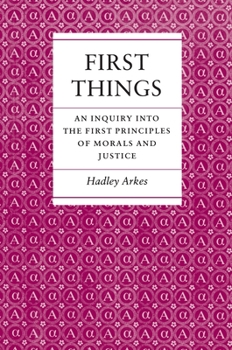First Things: An Inquiry Into the First Principles of Morals and Justice
Select Format
Select Condition 
Book Overview
This book restores to us an understanding that was once settled in the "moral sciences" that there are propositions, in morals and law, which are not only true but which cannot be otherwise. It was understood in the past that, in morals or in mathematics, our knowledge begins with certain axioms that must hold true of necessity; that the principles drawn from these axioms hold true universally, unaffected by variations in local "cultures"; and...
Format:Paperback
Language:English
ISBN:069102247X
ISBN13:9780691022475
Release Date:August 1986
Publisher:Princeton University Press
Length:447 Pages
Weight:1.38 lbs.
Dimensions:1.1" x 6.1" x 9.3"
Customer Reviews
4 ratings
Rich and challenging
Published by Thriftbooks.com User , 21 years ago
Other reviewers here have written about Dr. Arkes' argument re: slavery and moral principles; it is marvelous to see a superb intellectual argument for something that many of us, raised traditionally, accepted as established fact: "of course" there are moral principles, "of course" there are standards of behavior.To work through this soul-activity of arriving at the apprehension of the truth of those "of courses" is an important exercise that needs to be accomplished by a larger number of members of this polity. There is sufficient evidence to make a logical connection from the argument Lincoln and Douglas contested over slavery to the current public debate about the definition of human life - not in just abortion, but in cloning and euthanasia too.That argument is succinct: Simply having a plurality of popular opinion in one's favor does not finally establish the moral vindication of a position. Just because the voters in one state "legalize" euthanasia - or "legalize" property rights over other human beings - does not make it right.There's an interesting discussion in _First Things_ about the morality of pacifism and our society's acceptance of the refusal of certain groups to participate in military service.Now is a good time to recall that argument - that refusing to serve is not necessarily a more moral position than serving, that there is a moral good in performing a duty that the nation has called one to."Conscientious objectors" may be good people - but "conscientious riflemen" may be good people, too.
Arkes is a powerhouse!
Published by Thriftbooks.com User , 22 years ago
Arkes tone is at times superior and argumentative. However, this book offers a rare insight into a little known story,the underlying struggle to justify political action. The thesis, that objectively dicernable morals exist, is born out by an analysis that is clear, thorough, and thought provoking. I highly recommend it to anyone and everyone who can handle a bit of fun, if heavy, reading.
Changed my way of thinking
Published by Thriftbooks.com User , 24 years ago
This book was mandatory for my college philosophy class over seven years ago and was used for the entire duration of the semester. It changed my way of thinking. I now have the tools to think and form opinions independently of upbringing, cultural norms, and tradition. I have recommend this book to my friends, family , and acquaintences who demonstrate any interest in looking deeper into laws - into the philosophical realm of thier existence. No other book has influenced my way of thinking more.
Thoughtful arguments
Published by Thriftbooks.com User , 25 years ago
Throughout the years, Professor Arkes has established himself as one of the nation's finest natural law thinkers, and this book presents a thorough overview of his philosophy. In short, he attempts to show that moral principles can be discovered through human reason and not just based on emotion or tradition. This represents the foundation of natural rights, which includes the right to all aspects of freedom except those which can be shown to contradict the logic of morals (such as slavery). Since moral principles are universal and can be discovered by reason, freedom cannot be infringed simply based on majoritarian beliefs (the "might makes right" argument), but neither is freedom simply following one's conscience, since this will sometimes lead one to act in contradiction to moral laws. The argument is of course much more richly elaborated in the book and only by reading it in Arkes's own words can you appreciate it fully. The book is more than theory, however, and Arkes applies his principles to such controversial issues as religious exemptions, the obligation to rescue, and abortion. Even one who does not agree with all of the Professor's thoughts will still find this an enjoyable book written in an engaging yet witty manner.





